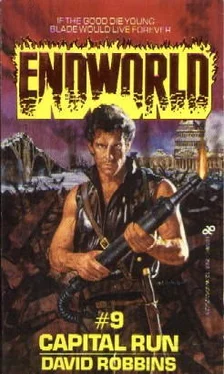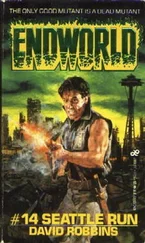David Robbins - Capital Run
Здесь есть возможность читать онлайн «David Robbins - Capital Run» весь текст электронной книги совершенно бесплатно (целиком полную версию без сокращений). В некоторых случаях можно слушать аудио, скачать через торрент в формате fb2 и присутствует краткое содержание. Город: New York, Год выпуска: 1988, ISBN: 1988, Издательство: Leisure Books, Жанр: sf_postapocalyptic, на английском языке. Описание произведения, (предисловие) а так же отзывы посетителей доступны на портале библиотеки ЛибКат.
- Название:Capital Run
- Автор:
- Издательство:Leisure Books
- Жанр:
- Год:1988
- Город:New York
- ISBN:978-0843925845
- Рейтинг книги:3 / 5. Голосов: 1
-
Избранное:Добавить в избранное
- Отзывы:
-
Ваша оценка:
- 60
- 1
- 2
- 3
- 4
- 5
Capital Run: краткое содержание, описание и аннотация
Предлагаем к чтению аннотацию, описание, краткое содержание или предисловие (зависит от того, что написал сам автор книги «Capital Run»). Если вы не нашли необходимую информацию о книге — напишите в комментариях, мы постараемся отыскать её.
Capital Run — читать онлайн бесплатно полную книгу (весь текст) целиком
Ниже представлен текст книги, разбитый по страницам. Система сохранения места последней прочитанной страницы, позволяет с удобством читать онлайн бесплатно книгу «Capital Run», без необходимости каждый раз заново искать на чём Вы остановились. Поставьте закладку, и сможете в любой момент перейти на страницу, на которой закончили чтение.
Интервал:
Закладка:
Funny.
She’d assumed she was too mature to believe in fairy tales.
Lex shrugged her shoulders and stuck to Rikki’s heels as he retraced their steps into the gloomy interior of the structure.
Chapter Sixteen
The gunfighter was in his element.
Hickok had been reared in the placid environment of the Home. He’d attended the Family school as required of all youngsters and teenagers, and been taught all of the profound spiritual truths the wise Elders knew.
Although he perceived the validity of a doctrine such as “Love thy neighbor” intellectually, he found the practical applications left something to be desired. How was it possible, he often asked himself, to love your neighbor when that neighbor might be a scavenger intending to kill you and rob you, or a mutate bent on tearing you to shreds? He discreetly distinguished a flaw in such a philosophy. To him, it never made any sense for the spiritual people to allow themselves to be wiped out by their benighted brethren. There was only one viable alternative: the spiritual types, such as the Family, had to protect themselves from the manifold dangers proliferating after the unleashing of the nuclear and chemical holocaust. Early on, Hickok discovered his niche in life. He didn’t think he was qualified to become a teacher or a preacher, but he knew he was more than competent to defend those who were spiritual from those who weren’t.
Warrior status fit him like the proverbial glove.
Because he devoted his entire personality to whatever interested him, Hickok rapidly became one of the Family’s top Warriors. His ambidextrous ability with handguns insured his prominence. And because he never fretted over the fate of the foes he downed in a gunfight, because he sincerely believed the Elders when they instructed him to accept the fact of survival beyond this initial life for anyone with the slightest shred of spiritual faith, he entertained few compunctions about pulling the trigger. In short, Hickok was one of the most proficient, and most deadly, Warriors in the Family. Some, such as Blade, insisted Hickok was the most deadly.
The Russians might have been inclined to agree.
Hickok spun and fired at the three soldiers coming through the glass doors. The AK-47 bucked and chattered, and the trio of troopers were struck before they could bring their own weapons to bear. They were catapulted backward by the impact of the heavy slugs tearing through their chests. The glass doors were hit too, and they shattered and crumbled with a loud crash.
There was no time to lose!
Four soldiers were still advancing from the direction of the hedgerow, and three were sprinting toward the gunman from the parking lot.
Hickok darted into the building, dodging the prone bodies blocking the doorway. He ran to the receptionist’s desk and ducked behind it, straddling her unconscious form.
Footsteps pounded outside, and a moment later the seven soldiers raced into the receptionist’s area.
Someone shouted orders in Russian.
Hickok tensed, wondering if they would look behind the desk or mistakenly suppose he had taken one of the corridors.
The footsteps tramped past the desk.
Hickok counted to three and rose, the AK-47 cradled at waist level.
The seven troopers were ten feet off and heading down one of the corridors.
“Peek-a-boo!” Hickok shouted.
To their credit, they tried to turn and shoot instead of diving for cover.
Hickok squeezed the trigger and swept the AK-47 in an arc. The soldiers were rocked and racked by the devastating hail of lead. Only one of them managed to return the gunman’s fire, and he missed, his pistol plowing a shot into the desk in front of the Warrior.
Two of them screamed as they died.
All seven were sprawled on the tiled floor when the AK-47 went empty.
Hickok tossed the gun aside and vaulted the desk. He ran to the glass doors and leaped over the three dead soldiers.
About a dozen people from the park, civilians by their attire, were tentatively congregating outside the Headquarters building.
Hickok charged them, drawing his Colts, hoping none of them was armed. They frantically parted as he jogged past, and then he was crossing a paved road and entering a large natural area with high, unkempt grass and a row of tall trees. He bypassed two children flying a kite and reached the safety of the trees.
No one was after him. Yet.
Hickok kept going, and once beyond the row of trees he paused to get his bearings.
That was when he saw it.
Whatever “it” was.
Off to his left, towering over the surrounding landscape, was a gigantic obelisk. The top portion was missing, apparently destroyed during the war, leaving a jagged crown at the crest.
What the blazes was it?
Hickok headed to the right. He spied a stand of trees 40 yards distant and made for them. He knew the soldiers would be after him in force, and he had to find a refuge quickly. But where? He didn’t know the layout of the city. Were there any safe areas, sections of the city inhabited only by descendants of the original Americans? Or had the Russians imported their own people to populate the city? And what about the ones he saw in the park? Were they Americans or Russians? For all he knew, he could be alone in a city where every person was an enemy.
The gunman reached the trees.
Hickok dropped to his knees, holstering his Pythons, gathering his breath. He saw a road yonder, past the trees, and beyond the road a long lake or pool.
Where the heck was he?
Frustrated, he slowly stood and walked to the edge of the road. Directly ahead was the pool. To his right was a wide, cleared space filled with pedestrians. To his left, the road seemed to branch out and encircle another pool. The air had a misty quality about it, and he wondered if he was near a large body of water.
Which way should he go?
The Red Army would be sweeping the area any minute. He decided to gamble, to mingle with the masses, hoping he could lose himself in the crowd. He walked from the trees and ambled parallel with the long pool.
A young man and an attractive woman, seated on a blue blanket with a wicker picnic basket by their side, glanced up as he approached.
“Hi,” the youth said.
“Howdy,” Hickok greeted them.
The woman gawked at the gunman’s waist and nudged her companion.
She whispered to him and his brow knitted in consternation.
Hickok was five feet from them.
“Nice guns you have there,” the youth commented nervously.
“I like ’em,” Hickok said.
“I thought guns were illegal,” the youth stated.
“Not mine,” Hickok assured him.
The youth and his lady friend exchanged hurried whispers.
Hickok passed them, his thumbs hooked in his gunbelt.
“Say, mister,” the youth ventured.
Hickok stopped and looked over his left shoulder.
“We just heard some shooting,” the youth said. “Was that you?”
Hickok scrutinized them, debating whether he could trust them.
“I’ve never seen anyone dressed like you before,” the youth remarked, rubbing his hands on his jeans as he spoke. “You stand out like a sore thumb. It’s none of my business, you understand, but if you’re looking for somewhere you won’t stick out, go around the west end of the Reflecting Pool, past the Lincoln Memorial, and go south. You’ll come to Independence Avenue, and on the other side is West Potomac Park. They don’t bother to cut the grass or trim the trees there and it’s a real jungle.”
“Why are you tellin’ me this?” Hickok demanded.
“I can put two and two together,” the youth said. “Gunshots. A stranger with a pair of revolvers.” The youth lowered his voice. “I may not be with the Resistance, but that doesn’t mean I like the Reds.”
Читать дальшеИнтервал:
Закладка:
Похожие книги на «Capital Run»
Представляем Вашему вниманию похожие книги на «Capital Run» списком для выбора. Мы отобрали схожую по названию и смыслу литературу в надежде предоставить читателям больше вариантов отыскать новые, интересные, ещё непрочитанные произведения.
Обсуждение, отзывы о книге «Capital Run» и просто собственные мнения читателей. Оставьте ваши комментарии, напишите, что Вы думаете о произведении, его смысле или главных героях. Укажите что конкретно понравилось, а что нет, и почему Вы так считаете.












